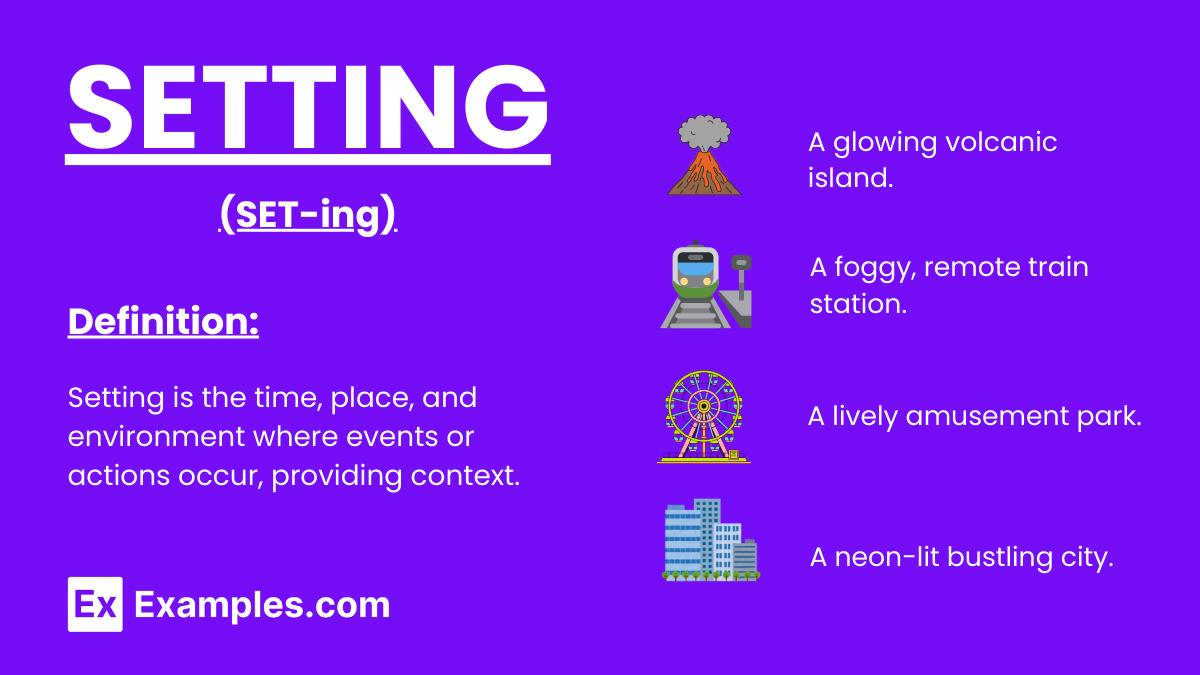Setting
What is Setting? – Definition
Setting is the time and place in which a story, event, or scene occurs, providing the backdrop and context that influence characters and plot development.

Generated Setting Examples

Examples of Settings
- A dense jungle as the backdrop for an adventure story.
- A bustling metropolis in a futuristic sci-fi novel.
- A quiet countryside cottage in a romantic novel.
- A high school setting for a coming-of-age drama.
- A serene beach town in a summer romance story.
- A hospital during a pandemic in a medical thriller.
- A space station orbiting Earth in a sci-fi adventure.
- A mysterious forest in a fantasy novel.
- A medieval castle in a historical drama.
- A barren desert in a post-apocalyptic tale.
- A suburban neighborhood in a family drama.
- A city park in a romantic comedy.
- An ancient museum in an archaeological thriller.
- An airport terminal in a drama about separation.
- A grand library in a mystery story.
- An abandoned factory in a horror novel.
- A cruise ship in a murder mystery.
- A snowy mountain cabin in a survival story.
- A luxury apartment in a drama about class differences.
- A sports stadium in a story about ambition.
- An ancient temple in an action-adventure story.
- A bustling restaurant in a culinary drama.
- A university campus in a thriller about secrets.
- A community theater in a heartwarming comedy.
- A small island in a survival tale.
- A cross-country train in a detective mystery.
- A lively nightclub in a crime story.
- A mystical grove in a fairy tale.
- A construction site in a drama about ambition.
- A stormy coastline in a suspense thriller.
Types of Settings
Physical Setting
The geographical and environmental aspects of a story’s location.
- A small village surrounded by mountains in a fantasy novel.
- A tropical island in an adventure story.
- A bustling cityscape in a modern drama.
- A dense forest in a survival thriller.
- A snowy landscape in a historical novel.
Temporal Setting
The time period in which a story takes place.
- The medieval era in a fantasy epic.
- The roaring 1920s in a historical drama.
- A futuristic timeline in a sci-fi novel.
- The present day in a contemporary romance.
- The post-apocalyptic era in a dystopian story.
Cultural Setting
The social and cultural environment shaping the story.
- A tribal village in an anthropological tale.
- A multicultural city in a global drama.
- An ancient empire in a historical novel.
- A carnival in a festive-themed romance.
- A monastery in a religious mystery.
Psychological Setting
The mental and emotional environment affecting characters.
- A lonely character living in isolation.
- A protagonist dealing with inner turmoil.
- A gloomy mansion reflecting a character’s despair.
- A tranquil retreat aiding a character’s healing.
- A serene forest symbolizing peace.
Social Setting
The societal norms, class structure, and interactions within the story.
- A close-knit community in a heartwarming tale.
- A hierarchical society in a dystopian novel.
- A rebellious group in a revolutionary story.
- A royal court in a historical drama.
- A business environment in a corporate thriller.
Symbolic Setting
A setting used to represent deeper meanings or themes.
- A desert symbolizing a character’s loneliness.
- A storm representing inner conflict.
- A sunrise symbolizing hope in a narrative.
- A mountain representing a character’s ambition.
- A vast ocean symbolizing freedom and mystery.
How to Identify and Understand Setting?
Identifying the setting involves recognizing the time, place, and environment in which a story or event occurs. It provides context and shapes the atmosphere of the narrative.
- Observe descriptions of locations, environments, and time periods.
- Note references to historical eras, seasons, or specific times.
- Identify geographical or cultural details that define the story’s background.
- Focus on clues in dialogue or narration that establish the setting.
- Analyze how the setting influences the characters or mood of the story.
How to Use Setting?
Using setting effectively involves crafting vivid descriptions of time, place, and atmosphere to immerse the audience and enhance the narrative.
- Use descriptive language to paint a vivid picture of the setting.
- Ensure the setting aligns with the theme and tone of the story.
- Incorporate sensory details to create a realistic environment.
- Reveal setting through character interactions or actions.
- Use the setting to evoke emotions and establish the story’s atmosphere.
Other Examples of Setting
Urban Setting
Stories set in bustling cities or metropolitan areas.
- A high-rise apartment in New York City.
- A crowded shopping district in Tokyo.
- A bus terminal during rush hour in London.
- A corporate office in a skyscraper.
- A vibrant nightlife district in Paris.
Rural Setting
Stories set in the countryside or remote areas.
- A quiet village surrounded by green hills.
- A farm with vast fields of wheat.
- A small cottage by the edge of a forest.
- A serene lakeside cabin.
- A family ranch in the countryside.
Historical Setting
Stories set in a past historical period.
- A medieval castle in Europe.
- An ancient Roman marketplace.
- A courtroom during the Victorian era.
- A battlefield during the American Revolution.
- A cobblestone street in 19th-century Paris.
Futuristic Setting
Stories set in advanced, futuristic worlds or societies.
- A bustling space station orbiting Earth.
- A high-tech laboratory on Mars.
- A megacity with flying cars and neon lights.
- A robot-inhabited planet.
- A futuristic colony on the moon.
Fantasy Setting
Stories set in magical or mythical worlds.
- A mystical forest filled with talking animals.
- A kingdom ruled by wizards and sorcerers.
- An ancient castle atop a floating island.
- A dark cave guarded by a fire-breathing dragon.
- A vast desert with hidden magical oases.
Post-Apocalyptic Setting
Stories set in a world after a catastrophic event.
- A desolate wasteland after a nuclear war.
- A city submerged under rising sea levels.
- A forest overtaking abandoned urban ruins.
- A survivor camp in the middle of a barren desert.
- A futuristic dome shelter protecting against a toxic atmosphere.
Explore Other Literary Devices
Elevate Your AP English Preparation
Unlock your potential with our comprehensive AP English exam preparation tools designed to help you excel.
- Extensive Question Bank: Access 900+ exam-like questions for both AP English Language and Literature.
- Expertly Crafted: Questions mirror the structure and difficulty of actual AP exams, ensuring relevant practice.
- Detailed Explanations: Understand your mistakes with clear, concise breakdowns of correct and incorrect answers.
- Personalized Learning: Tailor your study sessions with topic-specific tests and adaptive learning tools.
- Comprehensive Coverage: Master all aspects of the AP English curriculum with extensive guides and resources.
Frequently Asked Questions
-
What is a setting?
A setting is the environment, time, and location where events, actions, or interactions take place, providing context for a situation. -
Why is setting important in presentations or speeches?
The setting influences audience engagement, comfort, and understanding by aligning the environment with the topic or purpose. -
How can setting affect the outcome of an event?
The right setting can enhance focus, mood, and interactions, while a poorly chosen setting can distract or hinder productivity. -
Can setting influence personal experiences?
Yes, settings such as a peaceful park or a bustling city can shape emotions, thoughts, and behaviors in personal experiences. -
What are the components of a setting?
Components include physical location, time period, cultural influences, weather, and the atmosphere or mood of the environment. -
How does setting impact learning environments?
A well-designed setting promotes focus, creativity, and collaboration, while poor lighting or layout can hinder learning. -
What role does setting play in branding?
The setting of a brand, such as store design or website layout, creates a sensory experience that reinforces brand identity. -
Can settings be virtual?
Yes, virtual settings, such as online meeting platforms or digital environments, provide unique contexts for interaction and engagement. -
How is setting used in education?
Educational settings like classrooms, libraries, or online platforms are tailored to support teaching methods and student learning. -
How can one choose the right setting for an event or activity?
Consider factors like the purpose, audience size, atmosphere, accessibility, and available resources to select an effective setting.

